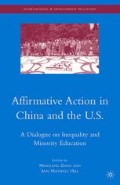Abstract
Forty years after being launched by President Lyndon Johnson at the height of the civil rights movement in the 1960s, affirmative action in the United States is in the throes of an acrimonious debate. The upshot is that this innovative public policy is in retreat, severely battered by relentless attacks from an extreme wing of the conservative right and its many allies. Led by White male lawyers, notably Roger Clegg of the provocatively named Center for Equal Opportunity, and his many allies, including high profile African American agent provocateur Ward Connerly of California, these well-organized, anti-affirmative action interest groups have forced elite universities and law schools to abandon practices that overtly strive to ensure some degree of racial diversity on their campuses (discussed later in this essay) and succeeded in passing ballot initiatives in California and Michigan that ban all forms of affirmative action in the public sphere.
Access this chapter
Tax calculation will be finalised at checkout
Purchases are for personal use only
Preview
Unable to display preview. Download preview PDF.
References
Adams, David W. 1995. Education for Extinction: American Indian Boarding School Experiences, 1875–1928. Lawrence: University of Kansas Press.
Connell, Richard, and Sonia Nazario. 1995. “Affirmative Action. Fairness or Favoritism? How Well Does It work?” Los Angeles Times, September 10: A1, A34-A36.
DeMott, Benjamin. 1991. “Legally Sanctioned Special Advantages Are A Way of Life in the United States,” The Chronicle of Higher Education, February 27: A40.
Dubois, W. E. B. 1903. The Souls ofBlack Folk. Chicago: A.C. McClurg.
Editorial. 1996. “Bad Law on Affirmative Action,” New York Times, March 22: A14.
Hebel, Sara. 2007. “An Interview with Barack Obama: ‘The Most Important Skill is Knowledge’,” The Chronicle of Higher Education, November 16: A24–A25.
Hu-DeHart, Evelyn. 2004. “An Asian American Perspective on Brown,” in The Unfinished Agenda of Brown v. Board of Education, eds. Black Issues in Higher Education, 108–122. Hoboken: John Wiley.
Hu-DeHart, Evelyn. 2008. “Asian Americans and Academic Achievement,” unpublished paper available upon request from author.
Johnson, Kevin, and Desda Moss. 1995. “Affirmative Action Debate Skips Women,” USA Today, February 28: A6.
Katznelson, Ira. 2005. When Affirmative Action was White. An Untold Story of Racial Inequality in Twentieth Century America. New York: Norton.
Kaufman, Jonathan. 2008. “Fair Enough? Barack Obama’s Rise Has Americans Debating Whether Affirmative Action Has Run its Course,” The Wall Street Journal, June 14–15: A1 and A8.
Lubin, Alex. 2005. Romance and Rights: The Politics of Interracial Intimacy, 1945–1954. Jackson: University Press of Mississippi.
Minzesheimer, Bob. 1995. “Affirmative Action Under Fire,” USA Today, February 23: 4A.
Myrdal, Gunnar. 1944. An American Dilemma: The Negro Problem and American Democracy. New York: Harper.
Portales, Marco. 2004. “A History of Latino Segregation Lawsuits,” in The Unfinished Agenda of Brown v. Board of Education, eds. Black Issues in Higher Education, 124–136. Hoboken: John Wiley.
Rockwell, Paul. 1996. “The GOP Misquotes Martin Luther King,” San Francisco Examine, March 18: A13.
Rosen, Ruth. 1996. “More Than Ever, UC Needs Goodwill,” Los Angeles Times, July 24: B5.
Saxton, Alexander. 1990. The Rise and Fall of the White Republic. London: Verso.
Spann, Girardeau. 2000. The Law of Affirmative Action: Twenty-Five Years of Supreme Court Decisions on Race and Remedies. New York: New York University Press.
Wickham, DeWayne. 1995. “Clinton Teeters on High Wire,” USA Today, March 6: A11.
Wilkins, Wilkins. 1995. “Racism Has its Privileges: The Case for Affirmative Action,” The Nation, March 27: 409–416.
Zhou, Minglang. 2008. “Models of (Multi)Nation State Building and the Meaning of Being Chinese in Contemporary China,” paper presented at the Critical Han Studies Conference & Workshop, Stanford University, Palo Alto, CA, April 25–27, 2008.
Editor information
Copyright information
© 2009 Minglang Zhou and Ann Maxwell Hill
About this chapter
Cite this chapter
Hu-DeHart, E. (2009). Affirmative Action, Civil Rights, and Racial Preferences in the U.S.: Some General Observations. In: Zhou, M., Hill, A.M. (eds) Affirmative Action in China and the U.S.. International and Development Education. Palgrave Macmillan, New York. https://doi.org/10.1057/9780230100923_13
Download citation
DOI: https://doi.org/10.1057/9780230100923_13
Publisher Name: Palgrave Macmillan, New York
Print ISBN: 978-0-230-61334-8
Online ISBN: 978-0-230-10092-3
eBook Packages: Palgrave Social & Cultural Studies CollectionSocial Sciences (R0)

